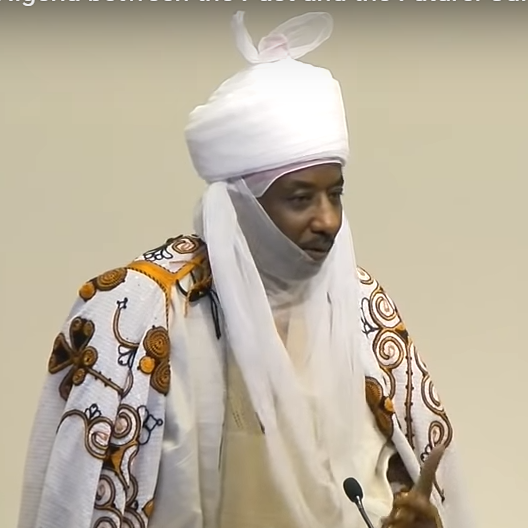
Sanusi Lamido Sanusi, CON (Ajami: سنوسي لاميطو سنوسي), also known by the religious title Khalifa Sanusi II (Ajami: خليفة السنوسي), is a prominent Nigerian traditional and religious leader, born on July 31, 1961. He is a significant figure in the Tijaniyyah Sufi order and a member of the Dabo dynasty. Sanusi was the 14th Emir of Kano, succeeding his great-uncle Ado Bayero on June 8, 2014. His tenure was marked by his advocacy for cultural reform in Northern Nigeria until his dethronement on March 9, 2020.
Sanusi was born into the royal Sullubawa clan in Kano. His father, Aminu Sanusi, was a prince and diplomat, and his grandfather, Muhammadu Sanusi I, was the 11th Fulani Emir of Kano. Sanusi grew up in the palace of his great-uncle Ado Bayero.
Sanusi received a blend of religious and secular education. He attended St. Annes Primary School in Kaduna and King’s College, Lagos. He earned a bachelor’s degree in Economics from Ahmadu Bello University in 1981, followed by a master’s degree in Economics in 1983. He also studied Islamic law and philosophy at the International University of Africa in Khartoum, becoming fluent in Arabic.
Sanusi began his banking career in 1985 with Icon Limited, a subsidiary of Barings Bank and Morgan Guaranty Trust. He worked at United Bank for Africa and later joined First Bank of Nigeria, becoming CEO in 2009. As Governor of the Central Bank of Nigeria (2009-2014), he led significant banking reforms, earning him international acclaim.
Sanusi’s reign as Emir began on June 8, 2014, amid controversy and political tension. Known for his outspoken views, he advocated for social and cultural reforms, including family planning, women’s education, and the revival of traditional industries. His criticisms of government policies and practices often brought him into conflict with political authorities.
On March 9, 2020, Sanusi was dethroned by Governor Abdullahi Ganduje. He was subsequently exiled to Nasarawa State but later released following a court order. Sanusi has since focused on academic and intellectual pursuits, holding positions such as a visiting scholar at the University of Oxford’s African Studies Centre.
Sanusi was appointed as the leader (Khalifa) of the Tijaniyyah Sufi order in Nigeria in May 2021, a role that holds significant religious authority in West Africa. He is also pursuing a PhD in Islamic Law at the University of London.
Sanusi is known for his writings on Islam, political economy, and cultural issues. He has called for justice and equity within Islam, the empowerment of women, and the revitalization of Northern Nigerian culture. His economic views emphasize structural reforms and diversification away from oil dependence.
Sanusi has received numerous accolades, including being named Central Bank Governor of the Year by The Banker magazine in 2010. He holds the title of Commander of the Order of the Niger and has been recognized by various international bodies for his contributions to Islamic finance and banking reforms.
Sanusi continues to be an influential figure in Nigeria, advocating for progressive change and maintaining a significant role in the religious and cultural spheres of West Africa.
Rice, a staple for Christmas celebrations in Nigeria, has become a luxury this year. Soaring…
Panic erupted on Saturday at a concert in Lagos when the stage collapsed during Odumodublvck’s…
The Federal Government of Nigeria has allocated ₦6,364,181,224 billion for the refurbishment and rehabilitation of…
The black market dollar to naira exchange rate for today, 22nd December 2024, can be…
The Nigerian National Petroleum Company Limited (NNPCL) has refuted claims that the 60,000 barrels per…
Manchester City finds itself in unprecedented turmoil, with relegation-level form showing little sign of improvement.…